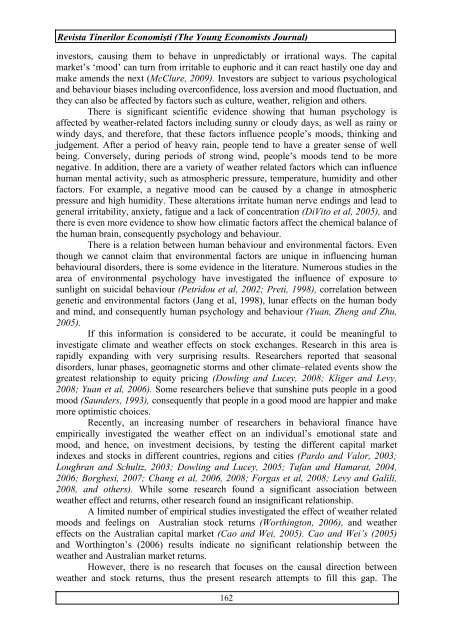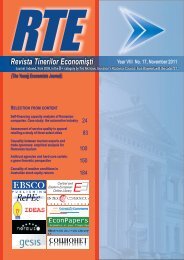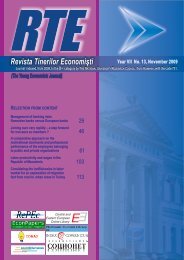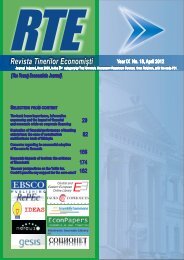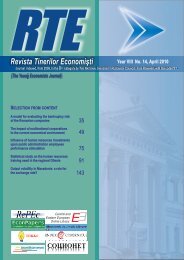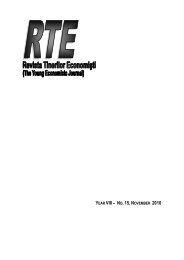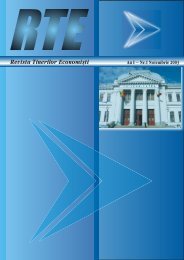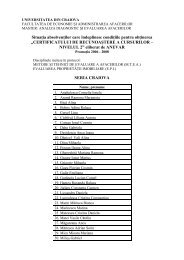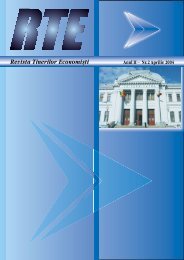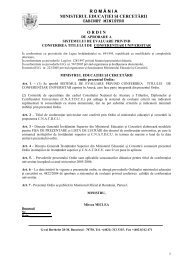Revista Tinerilor Economiºti (The Young Economists Journal)
Revista Tinerilor Economiºti (The Young Economists Journal)
Revista Tinerilor Economiºti (The Young Economists Journal)
You also want an ePaper? Increase the reach of your titles
YUMPU automatically turns print PDFs into web optimized ePapers that Google loves.
<strong>Revista</strong> <strong>Tinerilor</strong> Economişti (<strong>The</strong> <strong>Young</strong> <strong>Economists</strong> <strong>Journal</strong>)<br />
investors, causing them to behave in unpredictably or irrational ways. <strong>The</strong> capital<br />
market’s ‘mood’ can turn from irritable to euphoric and it can react hastily one day and<br />
make amends the next (McClure, 2009). Investors are subject to various psychological<br />
and behaviour biases including overconfidence, loss aversion and mood fluctuation, and<br />
they can also be affected by factors such as culture, weather, religion and others.<br />
<strong>The</strong>re is significant scientific evidence showing that human psychology is<br />
affected by weather-related factors including sunny or cloudy days, as well as rainy or<br />
windy days, and therefore, that these factors influence people’s moods, thinking and<br />
judgement. After a period of heavy rain, people tend to have a greater sense of well<br />
being. Conversely, during periods of strong wind, people’s moods tend to be more<br />
negative. In addition, there are a variety of weather related factors which can influence<br />
human mental activity, such as atmospheric pressure, temperature, humidity and other<br />
factors. For example, a negative mood can be caused by a change in atmospheric<br />
pressure and high humidity. <strong>The</strong>se alterations irritate human nerve endings and lead to<br />
general irritability, anxiety, fatigue and a lack of concentration (DiVito et al, 2005), and<br />
there is even more evidence to show how climatic factors affect the chemical balance of<br />
the human brain, consequently psychology and behaviour.<br />
<strong>The</strong>re is a relation between human behaviour and environmental factors. Even<br />
though we cannot claim that environmental factors are unique in influencing human<br />
behavioural disorders, there is some evidence in the literature. Numerous studies in the<br />
area of environmental psychology have investigated the influence of exposure to<br />
sunlight on suicidal behaviour (Petridou et al, 2002; Preti, 1998), correlation between<br />
genetic and environmental factors (Jang et al, 1998), lunar effects on the human body<br />
and mind, and consequently human psychology and behaviour (Yuan, Zheng and Zhu,<br />
2005).<br />
If this information is considered to be accurate, it could be meaningful to<br />
investigate climate and weather effects on stock exchanges. Research in this area is<br />
rapidly expanding with very surprising results. Researchers reported that seasonal<br />
disorders, lunar phases, geomagnetic storms and other climate–related events show the<br />
greatest relationship to equity pricing (Dowling and Lucey, 2008; Kliger and Levy,<br />
2008; Yuan et al, 2006). Some researchers believe that sunshine puts people in a good<br />
mood (Saunders, 1993), consequently that people in a good mood are happier and make<br />
more optimistic choices.<br />
Recently, an increasing number of researchers in behavioral finance have<br />
empirically investigated the weather effect on an individual’s emotional state and<br />
mood, and hence, on investment decisions, by testing the different capital market<br />
indexes and stocks in different countries, regions and cities (Pardo and Valor, 2003;<br />
Loughran and Schultz, 2003; Dowling and Lucey, 2005; Tufan and Hamarat, 2004,<br />
2006; Borghesi, 2007; Chang et al, 2006, 2008; Forgas et al, 2008; Levy and Galili,<br />
2008, and others). While some research found a significant association between<br />
weather effect and returns, other research found an insignificant relationship.<br />
A limited number of empirical studies investigated the effect of weather related<br />
moods and feelings on Australian stock returns (Worthington, 2006), and weather<br />
effects on the Australian capital market (Cao and Wei, 2005). Cao and Wei’s (2005)<br />
and Worthington’s (2006) results indicate no significant relationship between the<br />
weather and Australian market returns.<br />
However, there is no research that focuses on the causal direction between<br />
weather and stock returns, thus the present research attempts to fill this gap. <strong>The</strong><br />
162


